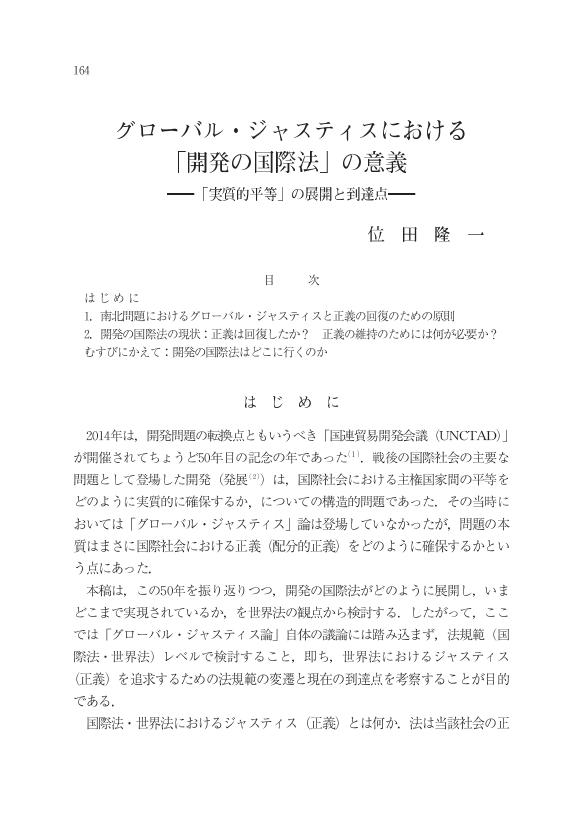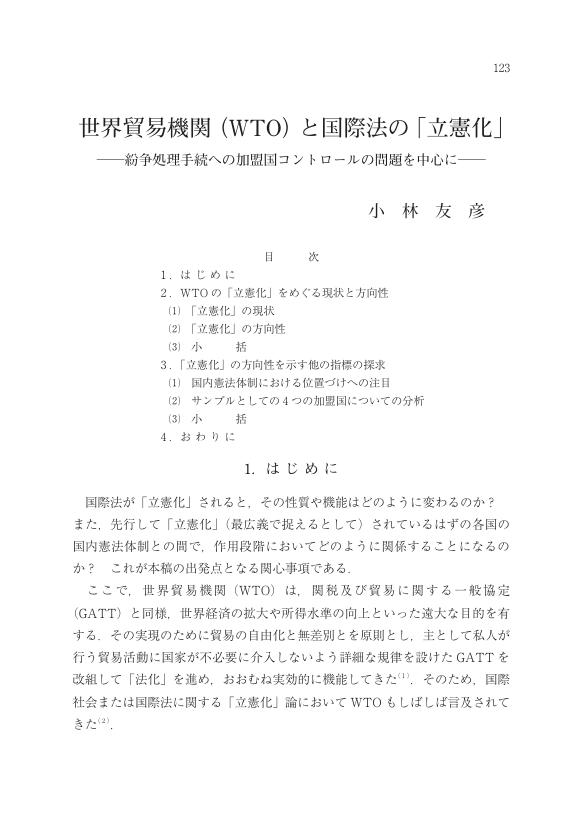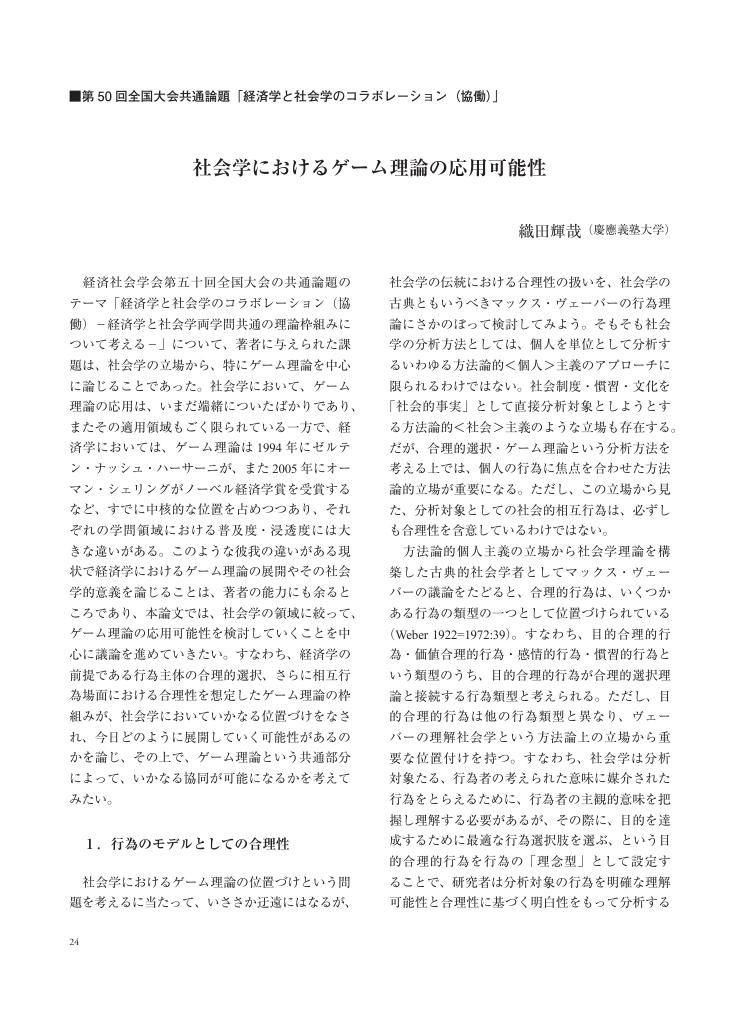2 0 0 0 OA ニーチェにおける「ましな人間(der höhere Mensch)」と肯定の問題
- 著者
- 中路 正恒
- 出版者
- 宗教哲学会
- 雑誌
- 宗教哲学研究 (ISSN:02897105)
- 巻号頁・発行日
- vol.3, pp.68-80, 1986 (Released:2018-03-14)
Higher Men are insufficient because they do not realize the nature of affirmation― for true affirmation is inseparable from that negation which negates those negative values which are created by the “will to nothing”. Therefore the affirmation conceived by them is merely an abstract image of true affirmation. True affirmation finds its power in the affirmability of life itself revealed in the experience lived of the “eternal return”. This affirmability of life itself is called Dionysos, and the affirmation that affirms Dionysos finds its principle in Ariadne, while the “eternal return” signifies the wedding ring between these divinities.
2 0 0 0 OA グローバル・ジャスティスにおける「開発の国際法」の意義
- 著者
- 位田 隆一
- 出版者
- 世界法学会
- 雑誌
- 世界法年報 (ISSN:09170421)
- 巻号頁・発行日
- vol.34, pp.164-187, 2015-03-28 (Released:2017-11-22)
- 著者
- 小林 友彦
- 出版者
- 世界法学会
- 雑誌
- 世界法年報 (ISSN:09170421)
- 巻号頁・発行日
- vol.33, pp.123-148, 2014-03-28 (Released:2017-11-22)
2 0 0 0 OA ヨーロッパ人権裁判所の判例にみる人権と多文化主義との相克
- 著者
- 北村 泰三
- 出版者
- 世界法学会
- 雑誌
- 世界法年報 (ISSN:09170421)
- 巻号頁・発行日
- vol.29, pp.86-123, 2010-03-28 (Released:2017-11-22)
2 0 0 0 OA 国連による紛争処理システムの構造と課題 20世紀の普遍的国際組織による紛争処理機能再考
- 著者
- 植木 俊哉
- 出版者
- 世界法学会
- 雑誌
- 世界法年報 (ISSN:09170421)
- 巻号頁・発行日
- vol.2004, no.23, pp.46-74, 2004-02-28 (Released:2011-02-07)
- 参考文献数
- 22
2 0 0 0 OA 国際海洋法秩序の50年
- 著者
- 小田 滋
- 出版者
- 世界法学会
- 雑誌
- 世界法年報 (ISSN:09170421)
- 巻号頁・発行日
- vol.1998, no.17, pp.1-25, 1998-03-20 (Released:2011-02-07)
- 参考文献数
- 13
2 0 0 0 OA 接続水域
- 著者
- 村上 暦造
- 出版者
- 世界法学会
- 雑誌
- 世界法年報 (ISSN:09170421)
- 巻号頁・発行日
- vol.1998, no.17, pp.44-62, 1998-03-20 (Released:2011-02-07)
- 参考文献数
- 21
2 0 0 0 OA 平和維持と国際連合のあり方 「新たなビジョン: 明日の国連」を手かがりにして
- 著者
- 小寺 彰
- 出版者
- 世界法学会
- 雑誌
- 世界法年報 (ISSN:09170421)
- 巻号頁・発行日
- vol.1989, no.9, pp.7-19, 1989-10-15 (Released:2011-02-07)
- 参考文献数
- 20
2 0 0 0 OA 世界法の概念について 田中, 恒藤両博士の概念をめぐって
- 著者
- 斎藤 恵彦
- 出版者
- 世界法学会
- 雑誌
- 世界法年報 (ISSN:09170421)
- 巻号頁・発行日
- vol.1988, no.8, pp.1-16, 1988-10-15 (Released:2011-02-07)
- 参考文献数
- 11
2 0 0 0 OA 現代消費社会と自由を巡る一考察
- 著者
- 市川 慧
- 出版者
- 経済社会学会
- 雑誌
- 経済社会学会年報 (ISSN:09183116)
- 巻号頁・発行日
- vol.37, pp.192-202, 2015 (Released:2016-03-25)
Though consumer society is tied up the notion of liberalism strongly, the purpose of this thesis is to reveal these placement associations. On the other hand the existence of consumer society is based on liberalism, the liberty in the consumer society provides to the consumer the wide range selection of commodity, the liberation from convention and tradition. As seen above, consumer society and liberalism are interdependence. In this way, the liberty in consumer society is recognized nearly as "negative liberty" that Isaiah Berlin said. The recognition that "the true freedom" is liberty from consumer society emerged from 1980s in Japan’s mature consumer society. But the act like anti-consumerism to flee from consumer society means obedience to some kind of consumer society’s code Jean Baudrillard said. That means every social activity is consumerism in contemporary society. Baudrillard said contemporary consumption is communication. In today’s phenomenon of consumer society that the trend of monologue consuming communication, consumption without physical exchange (like an information consumption) and obsolescence of consumer society in itself (so we don’t feel in "the cage of consumer society") brings to us subjective freedom in consumer society. But another side, nowadays, there is problem that consumer society is too free. Durkheim said that freedom is production of social regulation, and Arendt said freedom exists in positive action only. Like this, in the process of reaching true freedom in consumer society, social and public is required. It means the liberty of consumer society shifts to another dimension from the negative one. That will be "limited freedom, " but have loose relationship to others and access possibility to public.
2 0 0 0 OA 社会学におけるゲーム理論の応用可能性
- 著者
- 織田 輝哉
- 出版者
- 経済社会学会
- 雑誌
- 経済社会学会年報 (ISSN:09183116)
- 巻号頁・発行日
- vol.37, pp.24-33, 2015 (Released:2016-03-25)
2 0 0 0 OA 田村信一『ドイツ歴史学派の研究』 日本経済評論社,2018 年,viii+345 頁
- 著者
- 奥山 誠
- 出版者
- 経済学史学会
- 雑誌
- 経済学史研究 (ISSN:18803164)
- 巻号頁・発行日
- vol.60, no.2, pp.127-128, 2019 (Released:2019-10-14)
- 著者
- 竹永 進
- 出版者
- The Japanease Society for the History of Economic Thought
- 雑誌
- 経済学史研究 (ISSN:18803164)
- 巻号頁・発行日
- vol.61, no.2, pp.84-85, 2020 (Released:2020-02-29)
- 著者
- 小峯 敦
- 出版者
- 経済学史学会
- 雑誌
- 経済学史研究 (ISSN:18803164)
- 巻号頁・発行日
- vol.61, no.2, pp.78-79, 2020 (Released:2020-02-29)
- 著者
- Timm Graßmann
- 出版者
- The Japanease Society for the History of Economic Thought
- 雑誌
- 経済学史研究 (ISSN:18803164)
- 巻号頁・発行日
- vol.60, no.1, pp.58-78, 2018 (Released:2019-09-03)
- 被引用文献数
- 1 2
Abstract: With the continuing publication of the complete works of Karl Marx and Friedrich Engels (Marx-Engels-Gesamtausgabe, MEGA), a bulk of new material concerning Marxʼs studies of economic crises has been made available-with further releases expected to follow. These publications have revealed Marxʼs enormous efforts to examine in detail every economic cri-sis through which he lived. The most prominent examples are the three Books of Crisis (Kris-enhefte), which he compiled in 1857-58 amidst the first truly global economic crisis. This paper sets out to, first, provide an overview of new MEGA-texts regarding Marxʼs studies of contemporaneous 19th century revulsions. In the main part, a closer look will be taken at the origin of Marxʼs crisis studies in the 1840s. A comparison between his notes on James Millʼs Elements of Political Economy, written in the Paris Notebooks (1844), and his excerpts from John Stuart Millʼs Essays on Some Unsettled Questions of Political Economy, taken in his Manchester Notebooks (1845), reveals Marxʼs changing stance on classical political econo-myʼs ʻgeneral glut controversy,ʼ i.e., the debate over the (im)possibility of overproduction cri-ses in commodity-producing societies. In between his stays in Paris and Manchester, Marx took extensive notes on the works of Simonde de Sismondi in his Brussels Notebooks (1845), which played a major role in his break from anthropological-essentialist thinking. JEL classification numbers: B 00, B 51, E 32
2 0 0 0 OA 征服と交流の文明社会史 初期バークと近世ブリテンにおける歴史叙述の系譜
- 著者
- 佐藤 空
- 出版者
- 経済学史学会
- 雑誌
- 経済学史研究 (ISSN:18803164)
- 巻号頁・発行日
- vol.58, no.1, pp.49-68, 2016 (Released:2019-08-31)
Abstract: It is widely recognized that Edmund Burke, in his Reflections on the Revolution in France, claimed that the ancient constitution of England, chivalry, and the Christian religion had con-tributed much to the formation of the civilized states of Britain and Europe at large. This arti-cle shows that a distinct perspective of the history of civilization existed in the early writings of Burke, An Essay towards an Abridgment of the English History and Fragment: An Essay towards an History of the Laws of England, and also places the ideas of Burke in these works in the context of the early modern history of English historiography. The early writings of Burke clearly assert that throughout history, a civilization could be and had actually been shaped in England through numerous international exchanges between England and other countries. In doing so, his idea seems to have included a perception of empire, which was fur-ther advanced in his later political works. Burkeʼs ideas on conquest and international ex-changes are related to the views on English history developed by the seventeenth-century scholars Spelman and Brady in their works on feudal law; however, Burke was different from these scholars in considering conquest as a powerful driving force behind the formation of the English civilization. Although other historians of the early modern period had held simi-lar ideas about conquest, Burke distinguished himself from them by putting forward a gener-alized model of the civilizing process closely linked to various types of international ex-changes. JEL classification numbers: B 31, N 01.
2 0 0 0 OA ドイツ語圏における経済学史叙述の展開 経済学史成立の背景
- 著者
- 小林 純
- 出版者
- 経済学史学会
- 雑誌
- 経済学史研究 (ISSN:18803164)
- 巻号頁・発行日
- vol.56, no.1, pp.21-47, 2014 (Released:2019-08-24)
Abstract: To understand the evolution of economics in German-speaking countries, we ought to start from the mid-nineteenth century. The historiography of German economics was strongly in-fluenced by the German Historical School (GHS). Knies (1852) wrote a short history of economics from the viewpoint of the historical method, which was becoming a mainstream methodology at the time. Controversy over the method, which began in 1883 between Menger and Schmoller, was described as “Methodenstreit.” Scheel (1882) wrote on the his-tory of economics in a famous handbook on the eve of this controversy, and his work can be considered as representing the heyday of GHS. Similar to Knies, Scheel also depicted the contours of economic theory developed in England. Max Weber edited a bulky handbook and asked Schumpeter to write an article on the history of economics in the handbook. Schum-peter (1914) there showed the logical status of GHS in the history of economics. Schumpeterʼs article thus deserves special attention from the modern viewpoint. This study makes use of his suggestion to clarify the characteristics of GHS by distinguishing be- tween the old, the new, and the newer schools. The old school insisted that the classical theo-ry never had universal validity. The new school continued in this direction, but with an em-phasis on the historical importance of legislative, judicial, and conventional institutions. The newer school used typology to describe history. Employing a model of the energetic man, Schumpeter presented his idea of the dynam-ics of history. Historical breakthroughs require the insertion of dynamic heterogeneous ele-ments into a static state. Historians provide the bridge to dynamics for the economic theory (statics). Schumpeter, at an early stage in his career as an economist, was the very founder of dynamics, and developed the idea of integrated social science, with which he could under-stand the meaning of the methodological criticism of GHS against universalistic theory in general and write a useful history of economics. With the aid of Schumpeterʼs idea, we redis-cover the potential intellectual and scientific fertility of the German Historical School. JEL classification numbers: A 12, B 15, N 13.
2 0 0 0 OA 小林純『ドイツ経済思想史論集I・II』 唯学書房, 2012
- 著者
- 手塚 真
- 出版者
- 経済学史学会
- 雑誌
- 経済学史研究 (ISSN:18803164)
- 巻号頁・発行日
- vol.56, no.1, pp.142-143, 2014 (Released:2019-08-24)
- 著者
- 牧野 邦昭
- 出版者
- 経済学史学会
- 雑誌
- 経済学史研究 (ISSN:18803164)
- 巻号頁・発行日
- vol.56, no.2, pp.150-151, 2015 (Released:2019-11-30)
2 0 0 0 OA 最近の欧米のスミス研究から
- 著者
- 大島 幸治
- 出版者
- 経済学史学会
- 雑誌
- 経済学史研究 (ISSN:18803164)
- 巻号頁・発行日
- vol.56, no.2, pp.117-121, 2015 (Released:2019-08-26)














